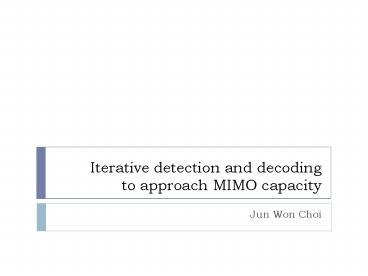Iterative detection and decoding to approach MIMO capacity - PowerPoint PPT Presentation
Title:
Iterative detection and decoding to approach MIMO capacity
Description:
Iterative detection and decoding to approach MIMO capacity Jun Won Choi Introduction MIMO capacity (CSI only at receiver) Fast fading scenario Ergodic I.I.D ... – PowerPoint PPT presentation
Number of Views:126
Avg rating:3.0/5.0
Title: Iterative detection and decoding to approach MIMO capacity
1
Iterative detection and decodingto approach MIMO
capacity
- Jun Won Choi
2
Introduction
- MIMO capacity (CSI only at receiver)
- Fast fading scenario Ergodic I.I.D. Rayleigh
fading Channel - Under fast fading assumption, transmission of
independent data stream with same power is
sufficient to achieve capacity (V-BLAST). - Capacity achieving Gaussian codes are used at
each antenna as outer code. - Slow fading scenario
- Coding across transmit antennas is needed ?
space-time coding, advanced layering
Teletar, 1999
3
Introduction
- Optimal transmitter structure
Signal processing operation (V-BLAST, D-BLAST,
space-time coding)
AWGN coder (outer code)
H
AWGN coder (outer code)
noise
Inner code
Coding across transmit antennas is needed in slow
fading
4
Introduction
- Optimal receiver structure
- Maximum a posteriori (MAP) decoder
- Model a received signal as Markov process whose
trellis is formed to include AWGN code,
space-time coding, and MIMO channel. - Map decoding rule is optimal.
- Computationally infeasible !
- Iterative detection and decoding (IDD)
- Divide decoding job into MIMO detection (inner
code) and AWGN channel decoding (outer code). - Approximately approach to optimal performance via
information exchange between two constitutional
blocks.
5
Transmitter design example 1 (IDD)
- Turbo-Blast (Haykin 2002)
- Random layered space time coding
Diagonal Layering
AWGN coder
Interleaver
M-ary modul
AWGN coder
Interleaver
M-ary modul
Space-time interleaver
6
Transmitter design example 2
- Space-time bit interleaved coded modulation
(Tonello, 2000)
M-ary mapper
AWGN coder
Interleaver
S/P
M-ary mapper
7
Principle of IDD
- Iterative (MIMO) detection and (channel) decoding
MIMO detector
Deinterleaver
SISO demapper
Information exchange
SISO channel decoder
Interleaver
Soft information is expressed as L-value
Priori LLR
Extrinsic LLR
8
IDD
- SISO Channel decoder
- BCJR algorithm based on trellis-based search
- Low-complexity APP decoder - LOG-MAX algorithm,
Soft output viterbi algorithm (SOVA) - MIMO detector
- Complexity and performance trade-off
- MAP versus Sub-optimal detector with linear
structure
9
Definition (Space-time bit interleaved coded
modulation)
10
Map detector
- Map detector
- A posteriori L-value of the bit
Extrinsic information (output)
11
Map decoder
- Map detection rule
- Log-Max approximation
- Complexity
- Complexity of MAP decoder is exponential in
modulation size, antenna size.
There are combinations for
each hypothesis.
12
List sphere decoding
- Idea (Hochwald, 2003)
- Find the combinations of symbol vector that are
highly likely to be transmitted. It is called
candidate list. - Define the candidate list, L as
- Then, extrinsic L-value can be find over such
candidate list, i.e.,
13
List sphere decoding
- List sphere decoding
- Efficient tree pruning problem
Form skewed lattice
Number of points
Sphere constraint
Lattice
14
Define the cost metric
Sphere constraint is violated.
Prune sub-tree.
15
List sphere decoding
- Procedure
- 1. Find the points inside sphere by tree search.
- 2. Select closest points. (when number
of points found is larger than predefined list
size) - 3. Increase radius and restart the search. (when
number of points found is less than list size) - 4. If candidate list has no common entry with
or , the extrinsic L-value is
set to inf or inf depending on the sign of
entries. - How to choose B?,
- For true x
16
Turbo-Blast detector
- Turbo-Blast detector
- Sub-optimal detector with linear structure
- Derive based on linear MMSE criterion
Assume that are
available.
Interference cancellation step
Interference nulling step
Let
17
Turbo-Blast detector
- Interference cancellation step
- Interference nulling step
18
Turbo-Blast detector
- Gaussian approximation
Interference noise term
There are only combinations
for each hypothesis.
19
Conclusions
- Capacity achieving MIMO architecture
- Transmitter architecture
- V-BLAST AWGN code for fast fading
- Coding across transmit antenna for slow fading ?
space time coding, D-BLAST, Treaded space time
coding - Receiver architecture
- Global MAP decoding
- Iterative detection and decoding
- Map decoding
- List sphere decoder
- Linear MMSE detector































